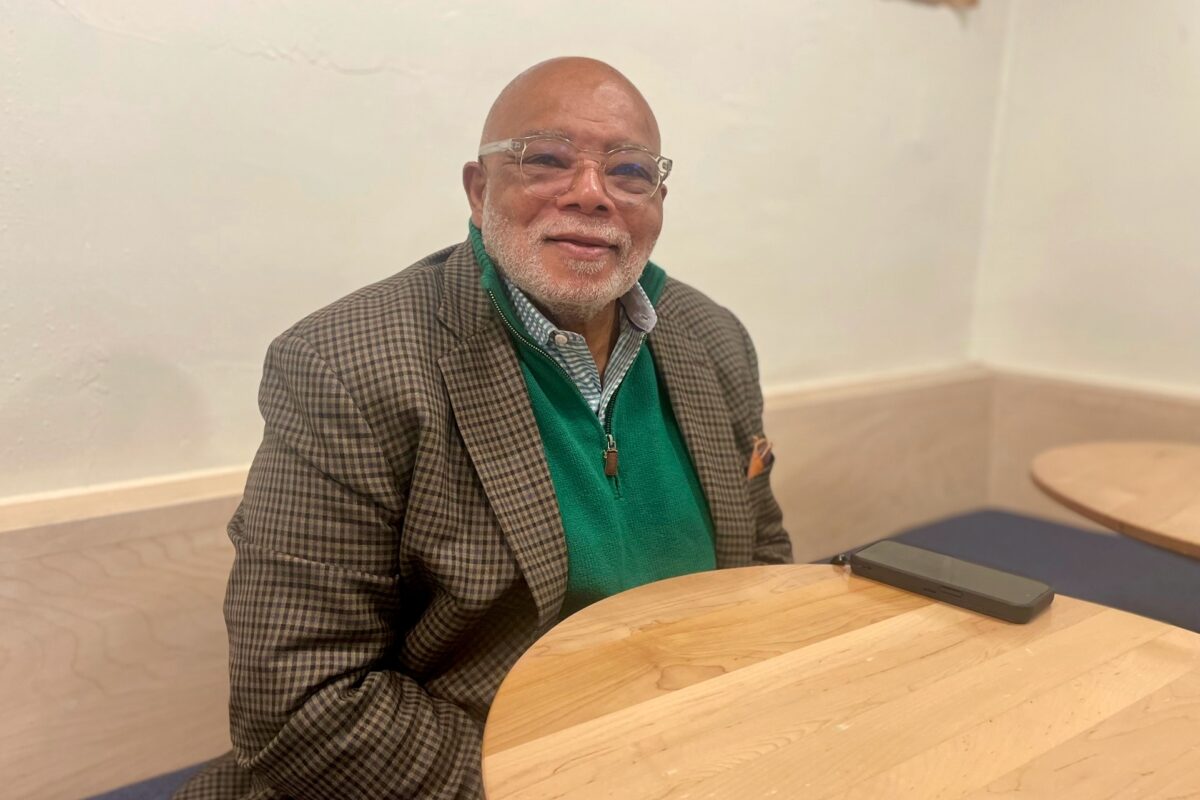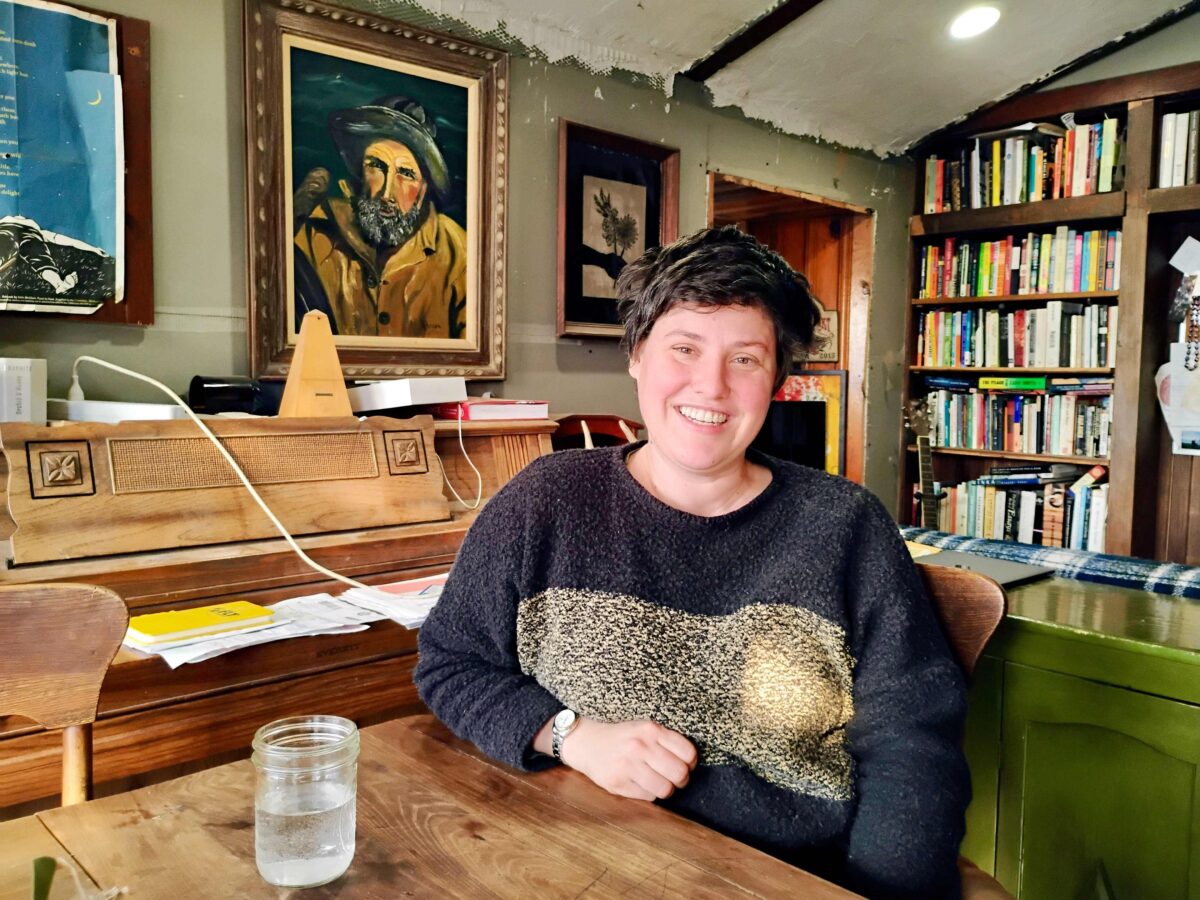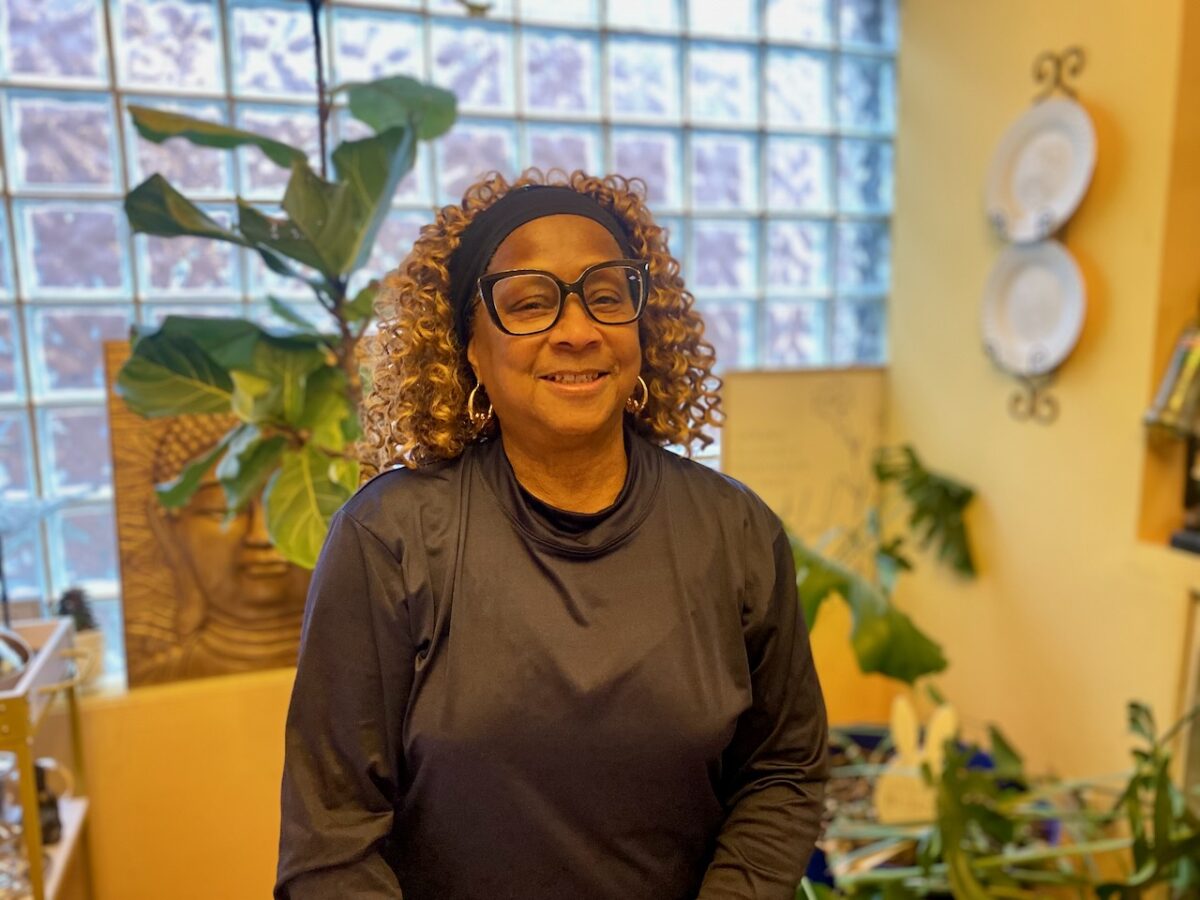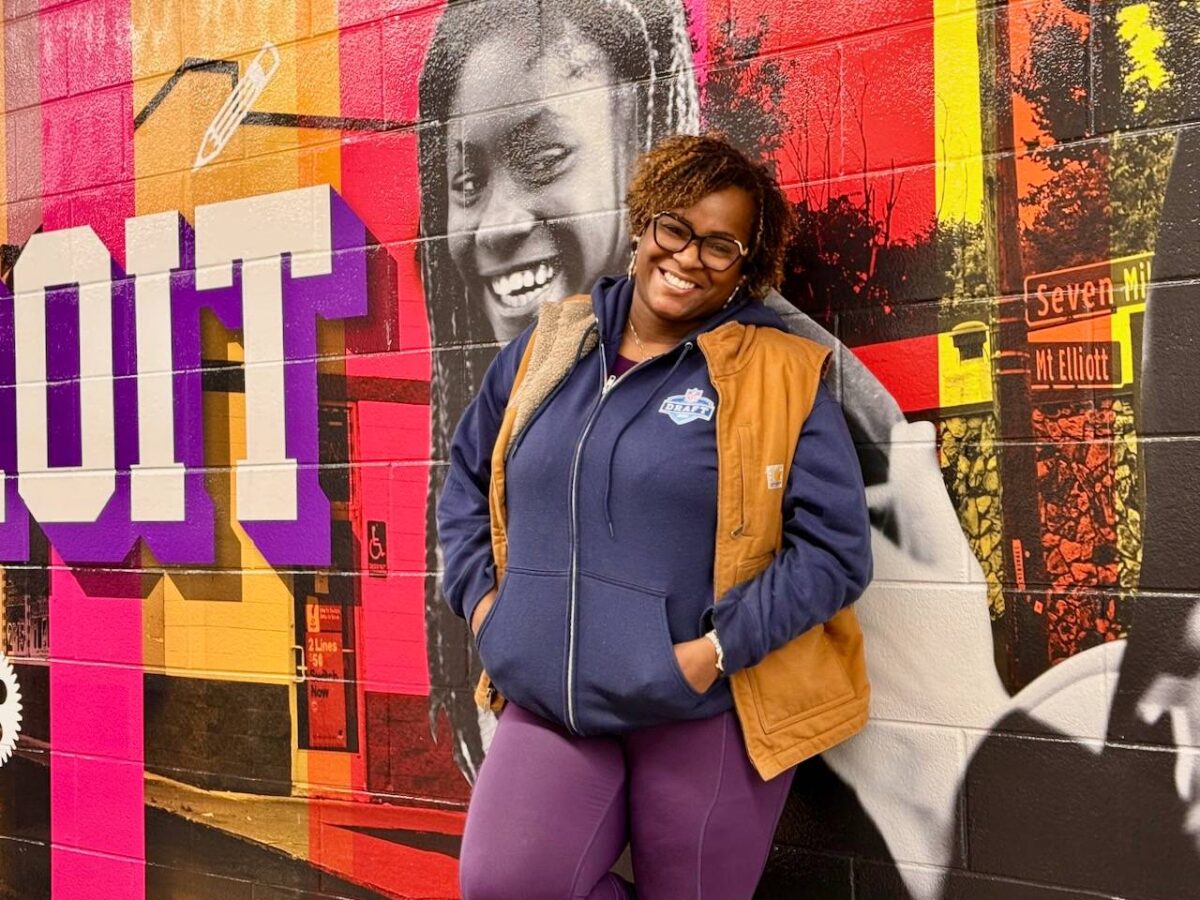Overview:
-"Pre-construction" on a $300 million MDOT project that would transform I-375 into a boulevard is scheduled to begin later this year.
-Elmwood Park resident Carl Bentley, who remembers discussing Black Bottom and Paradise Valley history with his father, is a member of the ReThink I-375 Coalition, which questions the transparency, timeline, and design of MDOT's plan.
-"If you see an injustice or wrong, you have to take action," Bentley tells Planet Detroit.
This story is published as part of Planet Detroit’s 2025 Spring Neighborhood Reporting Lab, supported by The Kresge Foundation, to train community-based writers in profile writing. This year’s participants will focus on highlighting grassroots leaders driving positive change in metro Detroit.
When Carl Bentley was growing up in Detroit nearly 60 years ago, his father told him stories of the historic Black Bottom and Paradise Valley neighborhoods, which were destroyed by so-called urban renewal projects including the construction of I-375, a freeway expansion project completed in 1964.
“He described how it was a place where people of all colors communicated and worked together,” Bentley said. “And then it was just blown up.”
It was these stories that spurred Bentley’s work with the ReThink I-375 Coalition, a resident-led group raising concerns about a new project to transform I-375 into a boulevard. The creation of the highway displaced thousands of residents as well as many businesses and disproportionately affected the African American community, according to a report on I-375’s impact prepared in 2023 by the Detroit City Council’s legislative policy division.
I-375 is 1 mile long and extends I-75 into downtown Detroit. The short freeway — and its planned revamp — are a topic of contention for the coalition. In an open letter to Michigan Gov. Gretchen Whitmer and Detroit Mayor Mike Duggan, the coalition wrote: “We are united in believing the plan proposed by MDOT (Michigan Department of Transportation) would actively disconnect our community, and threaten decades of our neighborhood’s stability.”
Bentley, a resident of Elmwood Park, said he first became involved in the debate over the I-375 project during a 2024 community meeting led by State Sen. Stephanie Chang. After that meeting, Bentley and other east side residents, including those from the Lafayette Park, Elmwood Park, and Indian Village neighborhoods, stayed in touch and formed the ReThink I-375 Coalition.
“We’re just trying to get some answers,” Bentley said. “We want to know what this project is really going to look like and who’s really going to benefit from it. But we just keep hitting a wall. We keep asking questions and we get no answer.”
I-375 project requires ‘true community partnership,’ Bentley says
The removal of I-375 is spearheaded by the Michigan Department of Transportation with the city of Detroit, Downtown Detroit Partnership, and Kresge Foundation as project partners. The state estimates the total cost of the project at $300 million.
“The existing freeway is old and doesn’t meet current standards for safety and reliability while presenting challenges for those who do not drive,” MDOT said on its website.
“The I-375 service drives and overpasses are inadequate for people who walk, bike or have mobility challenges. Due to its age and condition, I-375 is ready to be transformed into a vibrant urban boulevard complete with modern amenities to serve all modes of travel.”
Given Bentley’s interest in the Black Bottom and Paradise Valley neighborhoods, he said he’s not opposed to the promises of vibrancy and amenities. It’s a lack of planning and resident input that concerns him and other coalition members, he said.
“It should have a true community partnership. It should be true to the project and the local residents,” Bentley said.
These concepts – community and partnership – are so important to Bentley that fellow coalition members use them to describe his work on behalf of their cause.
“Carl has made a huge difference to the coalition,” said Lafayette Park resident and group member Olga Stella, who has known Bentley for 15 years.
“This effort requires stamina because of the length of the project, and Carl has consistently shown up and kept things going. I count on him as a key partner.”
I-375 group questions $300 million project’s environmental impact
Some of the questions to which Bentley and the coalition members say they want answers concern the environmental impacts of construction, restorative justice, community involvement, and economic outcomes.
MDOT describes its restorative justice approach – in terms of Black Bottom and Paradise Valley – on its website in a statement: “MDOT recognizes this historic environmental justice impact and is committed to working with the community to honor the history of the neighborhoods with a focus on equitable engagement and opportunities through community enhancements.”
Bentley and the coalition take issue with MDOT statements like the one above, focusing on what they say is a lack of detail and specificity. They also accuse MDOT of purposely avoiding their requests for information, including not disclosing the project’s timeline and ignoring their concerns about safe access to the Detroit Medical Center, a trip that many residents complete more quickly thanks to I-375.
MDOT heard the coalition’s concerns in August and September 2024, MDOT spokesperson Rob Morosi told Planet Detroit in an email, adding that coalition members attended a neighborhood meeting in January of this year and a March Local Advisory Committee meeting.
Regarding the project timeline, Morosi said that MDOT has shared project timelines with the coalition during one-on-one listening sessions. Concerning safe access to DMC, Morosi said that MDOT has revised design plans to create access to Mack Avenue from the service drive, with new connections from Beaubien and Brush.
The coalition is also unsatisfied with the Local Advisory Committee, a group that MDOT has tasked with providing input and ideas on design elements as well as ways to repurpose or leverage excess property. Bentley said that MDOT is secretive about LAC meeting dates, often cancels previously scheduled meetings, and handpicked the committee’s members. He said he wants a more open and independent community advisory group.
MDOT provided a schedule of LAC meetings to the public and the coalition, spokesperson Morosi said. Exact dates are subject to change due to space availability, information development, and unforeseen circumstances such as weather, he said. Two LAC meetings have been cancelled, and one was postponed to a later date, he said.
“MDOT partnered with the City of Detroit to establish (the LAC) and, since its inception, has brought additional members on board,” Morosi said about the coalition’s concern that MDOT handpicks LAC members.
“The LAC is not a closed committee and is made up of representatives who live in adjacent neighborhoods, own businesses in the surrounding area, non-profit organizations, faith based institutions, and community groups who have cultural or historic ties to the project area.”
In addition to these objections, the coalition is concerned about environmental impacts. Bentley said that MDOT has not been responsive to questions on this topic and is focused only on working with residents of Lafayette Park, which directly borders I-375.
“The dust isn’t going to hit a wall at St. Aubin,” Bentley said, in reference to the street that marks the border between the Lafayette and Elmwood Park neighborhoods.
“Pre-construction” is expected to begin in the fourth quarter of this year, and heavy construction is planned between 2026 and 2028, according to the state agency’s website.
“The process and feedback will dictate the timeline of the overall project schedule and readiness for construction,” according to MDOT.
The coalition’s website includes an open letter to Whitmer and Duggan about the I-375 project. Thesite outlines 11 points the coalition said it would like to see addressed, including completing a framework plan, developing an inspiring vision and clear principles, and demonstrating how community feedback is being used.
With construction scheduled to begin this year, Bentley and other coalition members will continue to pressure government agencies and leaders for change and educate community members about the details of the project, he said.
“I’ve always wanted to be part of the solution,” he said. “If you can formulate a solution, you should take action.”
MORE FROM THE NEIGHBORHOOD REPORTING LAB
Brittney Rooney grows food on Beaverland Farms — and community in Brightmoor
Beaverland Farms, a 4-acre urban farm in Detroit, is empowering female growers through full-time employment and sustainable cultivation practices, expanding its reach to local customers and fostering community growth.
Is lifelong learning the key to success? This Detroit teacher says yes
Deborah Jenkins, a Detroit educator, champions collaboration between parents and teachers to secure quality education for children, while pursuing her own lifelong learning.
Lifelong advocate steps back — but not away — from Detroit’s Regent Park. Her new focus might surprise you.
Attorney Marcia Spivey, a longtime advocate in Regent Park, is dedicated to enhancing residents’ lives and recently joined Planet Detroit’s Neighborhood Reporting Lab to boost community outreach.
‘If you see an injustice or wrong, you have to take action’
Bentley’s commitment to the ReThink I-375 Coalition likely stems from his role models as a child, he said. The adults in his family worked hard and didn’t hesitate to take action when a problem came to their attention. Today, that work ethic and problem-solving ability are defining aspects of Bentley’s approach to life.
“My dad worked in a factory and he had two jobs, and my uncles were all very hardworking,” he said. “I got their work ethic and I believe you can’t just sit around and wait for things to happen. If you see an injustice or wrong, you have to take action.”
Bentley has two adult daughters: one works in medical sales and the other is a teacher. His wife, former Detroit City Council President Saunteel Jenkins, is running for mayor in Detroit’s municipal election this year. She is a survivor of Stage 3 breast cancer
Bentley recently retired from Strategic Staffing Solutions after a 22-year career.
Before his time at S3, Bentley had a long career in IT. He first started working in the field as a student at Cass Technical High School. As part of a co-op program, Bentley was assigned to work for the former MichCon utility company as a data processor. Until the 1980s, MichCon provided gas for most of the southern half of Michigan’s Lower Peninsula. Bentley’s IT career at MichCon grew over the years until he was recruited to work for former Detroit Mayor Dennis Archer during his time in office.
During this period, he met J.G. Love, who worked in the fire department and is now a fellow leader in the I-375 coalition. The two formed a professional relationship and today are close friends.
“Respect is not given by communities or individuals, true respect is earned,” Love said. “Carl has earned the respect of the community by the way he carries himself and his reputation.”





